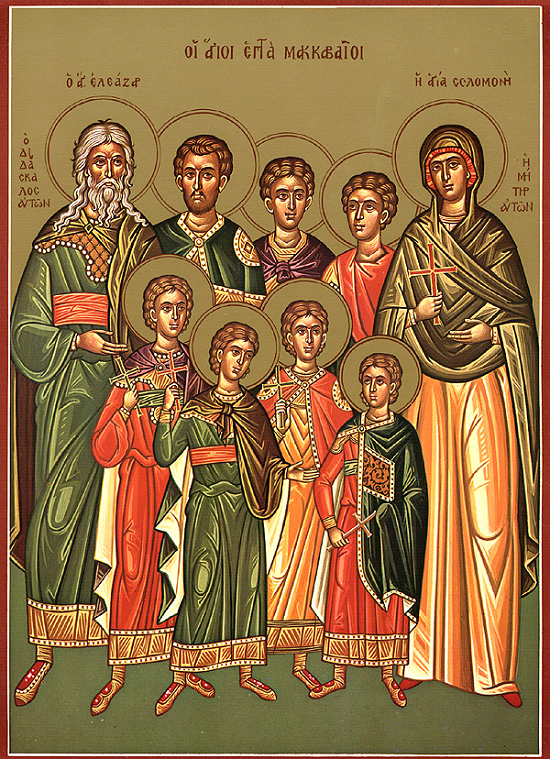Thirty-second Sunday Scripture Readings

Death has always been the bane of human existence. Yet, human beings continue to strive for immortality. Even without the hope for personal immortality, people have at least imagined that they could somehow survive death in and through their children. Who hasn’t imagined that some aspect of their ancestors still lives within them? And what parent hasn’t thought that some part of themselves would carry on through their offspring? We marvel at the traits we share with those in our family line: physical traits, personality traits, behavioral traits. Whether or not we’re parents, we still have an interest to see that the family name is carried on.
Even family continuity isn’t sufficient to satisfy our longing. Who doesn’t want to be remembered, as though the memory of you alone would keep you alive? Some cultures don’t count their people as truly dead until the last person who knew them had died. For those cultures, people literally survive and live on in others’ memories. There are so many other ways people attempt to achieve immortality. Before the advent of photography, people painted portraits—in caves, on the walls of tombs, or on canvas to keep their image—their imago, their icon—alive. Before writing, stories of the ancestors were passed down from generation to generation in oral traditions. Writing preserved these stories of the immortals for hundreds or thousands of generations. We know the names and exploits of people who lived well over five thousand years ago, and there’s no sign that their stories won’t survive another five thousand years.
Early on, the remembrance—the hope of immortality—applied only to the great ones: the founders, the leaders, the heroes. In fact, throughout history, the majority of us humans belonged to the great mass of expendables and forgettables. For them, any sort of immortality beyond the lives of their children seemed out of the question.
The Sadducees had their own way of coping with that dilemma. God had already blessed them with status, position, and wealth. They were already the elites: the priests and chief priests, the nobles and princes. They lived at the top of the hierarchy, and they not only safeguarded their positions jealously, they strove to maintain the status quo to assure that they stayed there. They cemented their fortunes and positions by collaborating with the Romans. They understood well where their security lay and, for them, solid security trumped any vague promise. They weren’t waiting for eternity to dawn, they were out to enjoy their immortality here and now.
When the Sadducees approached Jesus, they came to mock the idea of a continuation of life after death—as many people do today. To prove their point, they took an obscure passage from the Book of Deuteronomy [25:5-10] and took the common interpretation to its absurd conclusion. The passage’s requirement for a brother to marry his brother’s childless widow was meant to assure that the brother’s bloodline—his genetic immortality—would continue. The Sadducees could buy into that. But, when they projected the situation into life after death, the situation appeared to them and to the crowds to be absurd. Apparently, the Sadducees had been fond of using this argument of theirs to stump the Pharisees who did believe in the resurrection and the life of the world to come. They wanted Jesus to be caught in the conundrum.
Jesus was far wiser than that. First, he refuted their argument by pointing out that the fallacy lay in trying to project the characteristics of this life into the next. That’s based on a false assumption that the “coming age” will be anything like the present one. Jesus compared the resurrected with the angels who in no way depend on procreation for their immortality. Their immortality is, as it were, built in. Indeed, procreation among the citizens of heaven is in itself absurd.
That’s not all. The Sadducees suffered a major setback when Jesus offered them an unexpected counterargument. Whereas their approach had been based on an obscure passage in Deuteronomy that even they ignored in practice, Jesus brought up a quote from the Book of Exodus which is the foundational passage for their whole system of belief—that passage where God reveals himself to Moses and allows Moses to know God’s hidden and most intimate name: Yahweh, the God of Abraham, Isaac, and Jacob, the God of the living.
Jesus reaffirmed the immortality of the family of Abraham—in this life, a family of blood relations, in the life to come, a family of common faith. It’s no longer a family based on procreation, but a family based on faith and choice. Faith tells us that Yahweh has chosen us to be God’s adopted sons and daughters, and therefore we are heirs of his promise. In return, we take upon ourselves the choice that Joshua made when he declared, “As for me and my family, we will serve Yahweh” [Joshua 24:15]. Can you see how immortality through the family has been transformed by the teachings of Jesus? Our family does, indeed, provide us with immortality, but our family is incredibly more inclusive than we might ever have imagined. It’s no longer our family by ancestry or name, it’s our family by faith—our human family, adopted by God, where we find eternal life.
The adoption of our human family as children of God began with Abraham’s belief in God’s promises. Abraham’s faith was never theoretical, nor should ours be. Proof of our immortality, our resurrection to eternal life after death was manifested in the resurrection of Jesus from the dead. Jesus’s resurrection is the proof, once and for all, that the Sadducees were wrong, and, indeed, the resurrection of the dead is our inheritance as adopted children of God by faith.
Get articles from H. Les Brown delivered to your email inbox.
